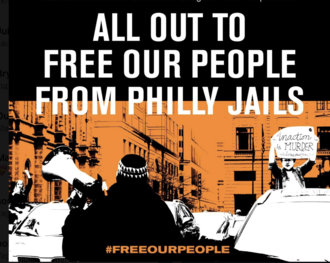- Featured
- Afropunk Army
- Community Control
- Confederate Symbols
- Cop Watch
- Corporate Accountability
- Criminal Justice Policy
- Drop/Bring Charges
- Economic Justice
- Education
- Employment Discrimination
- End The War on Black People
- Environmental Justice
- For-Profit Colleges/Universities
- Gulf Coast
- Housing Rights
- Immigration
- Invest-Divest
- Media Accountability
- Music Industry
- No Guns in Schools
- Open Internet
- Police Accountability
- Political Power
- Pop Culture
- Private Prisons
- Reparations
- Reproductive Justice
- Right Wing Racism
- School-to-Prison Pipeline
- Sports
- Voting Rights
- Wrongful Imprisonment
- More
-
Make Juneteenth an Official California State Holiday!Every year our states celebrate the Fourth of July to honor our nation’s independence from Great Britain, in 1776. The United States continued to deny freedom to enslaved Africans for almost another 100 years. We still do not have a national holiday celebrating the official end of the brutal enslavement our Ancestors endured. Despite Abraham Lincoln’s efforts with the implementation of the Emancipation Proclamation that took effect on January 1, 1863, the executive order was not enforced in Texas until June 19th when Union Gen. Gordon Granger rode in to deliver the news after the official end of the Civil War, in 1865. Even though the E.P. took place in 1863, Texas was considered a fringe state. As a young mixed Black womxn, moving through Oakland public schools did not allow me the opportunity to learn about my heritage and/or ancestors in the way that I believe we should have. Only after graduating have I come to understand our history and the importance of Juneteenth. Juneteenth marks a day of the utmost significance in American history. It represents the ways in which freedom for Black people has been delayed. It should be celebrated as the day when all Americans were liberated.1,115 of 2,000 SignaturesCreated by Aminah Hanif
-
Tell Congress to Make Juneteenth a National HolidayJuneteenth (June 19th) signifies the ending of slavery and the liberation of formerly enslaved Black people in the United States. The holiday was created in remembrance of June 19, 1865, the day that some of the last set of Black enslaved people in Galveston, Texas received the news of their emancipation. Many Black Americans prefer to celebrate Juneteenth over July 4th. Juneteenth is a day for Black people to appreciate our ancestors, remember all they went through and to celebrate the resilience of Black People in America. Juneteenth also has significance beyond the Black community; it also serves as a unifier. Juneteenth symbolizes the unity of America at a time, just like now, where it appears as if there is little unity to be found. Juneteenth can serve as unifying event because it recognizes that formerly enslaved Africans who made pleas for their freedom, had allies in the fight. Allies at the time included Quakers along the Underground Railroad, abolitionists both Black and white, such as Frederick Douglass and William Lloyd Garrison, and soldiers who gave their lives for the freedom of the formerly enslaved. Please sign our petition to recognize Juneteenth as a national holiday and share with your networks as well!6,891 of 7,000 SignaturesCreated by Opal Lee
-
Safe Elections Not Voter Suppression: Stop Photo Voter IDOver the last decade, the North Carolina General Assembly leadership has consistently and brazenly manipulated election and redistricting laws to silence Black voters and reduce Black political power, all in the name, they have proudly said, of expanding and entrenching their partisan control. Courageous legislators have stood up, session after session, and spoken truth to power about the racist and cynical intent behind these actions. H1169, the Bipartisan Elections Act of 2020, could have represented a break from the relentless partisanship and attacks on Black voters that have become the norm in North Carolina’s elections and redistricting bills. But rather than come together to advance necessary policy changes responding to the current COVID crisis, House and Senate leadership opted to first insert the lightning rod issue of photo voter ID and then other non-COVID-19 related provisions into the bill. These actions taken together are a clear attempt to impact their litigation position regarding the 2019 law (SB824) currently enjoined by two courts and to continue partisan efforts to give their party the upper hand in the 2020 election. We must ensure that H1169, the Bipartisan Elections Act of 2020, serves only to improve access to voting for all constituents. Unrelated provisions that seek to sneakily reactivate photo voter ID are a deceitful attempt to undermine the courts who have blocked this law time and again. It is imperative that you stand up for racial justice in this moment by speaking truth to legislative leadership -- Photo Voter ID has no place in a COVID-19 elections bill. H1169 is supposed to make voting easier for North Carolina voters during this pandemic, NOT to confuse voters and seek to reactivate shameful, racist barriers designed to undermine a free and fair democracy. Call to Action: HB1169 Please visit the "My Campaign" link below to access the full H1169 Bill. To read: "PHOTO VOTER ID SECTION 10. G.S. 163-166.16(a) reads as rewritten: 45 "(a) Photo Identification Required to Vote." Please visit the "My Campaign" link below to access the full H1169 Bill.535 of 600 SignaturesCreated by NC Black and Brown Policy Network
-
Justice for Javier Ambler IIOn March 28, 2019, Javier Ambler - a resident of Austin, Texas was driving home early in the morning with his brights on and passed by a Williamson County Deputy J.J. Johnson. This resulted in a police chase where he crashed his car five times and was continually and tased by the officers that apprehended him. He got out of his car with his HANDS RAISED but could not physically put his hands behind his back due to obesity. He was outnumbered, tased and forcibly restrained. Ambler's pleas for mercy and warning of his severe heart condition were ignored and he soon passed away on a neighborhood street. Over a year has passed- footage of his untimely death (that the Williamson County Sheriff's Office withheld) has been released granting his family closure but not justice. The Williamson Country Sheriff's Office has not held Deputy J.J. Johnson and Deputy Zachary Camden accountable for their actions. By signing this petition you are urging that the deputies who wrongfully abused and murdered Javier Ambler are suspended from their positions and charged. Please sign and share. Black lives matter!!!!!!!We demand JUSTICE for Javier Ambler!!!!!!!19 of 100 SignaturesCreated by Alessandra Reed
-
Tell Atlanta to Move $18 Million from Cuffs to Care!In a time of public health crisis and a $40 million budget deficit, it is unconscionable for the City of Atlanta to spend $18 million to lock people in cages for jaywalking and disorderly conduct. We can, in no way, allow for this jail - and potential hotspot - to exist any longer in our community, wasting desperately needed resources, criminalizing people for being poor, and making us all less safe.3,210 of 4,000 Signatures
-
Approve S.O.S. Stimulus Grants for Micro BusinessesOur tax dollars should be used to support churches, local restaurants, bodegas, barbershops, hair salons, dine-in restaurants, retail stores, Uber Drivers, and independent contractors who struggle....not "small businesses" that are publicly traded and have access to investors and big bank loans. This bill is for the business that watched as Shake Shack received millions, and felt defeated. Seventy-five percent (75%) of the Saving Our Streets (S.O.S.) Act would be used to provide grants worth up to $250,000 dollars to historically under-represented who are socially and economically left out - businesses owned by people of color, the formerly incarcerated, low-income, women. These are the business owners that banks denied, the business owners who can't call up the Senior Vice President of a major financial institution and ask for a "favor." Additionally, tiny businesses that have fewer than 10 employees (less than 20 employees if you're in an underserved community) AND have less $1 million in business revenue. This is NOT for publicly traded companies or hedge funds. They got access to their share. The SOS bill was set up for businesses that cannot compete with Ruth Chris, Potbelly, the Lakers - who benefited from programs like the Payment Protection Program. When you sign this petition, you are fighting for the self-employed, the Uber Drive, the FIverr contractor, the hair salon, the barber shop, the soul food spot....you are fighting for the side hustler who has to fight with their employer just to get fair pay. You are fighting for the businesses who fight to SERVE YOU every day. Press: "Sen. Kamala Harris and Rep. Ayanna Pressley have a $125 billion plan to help the smallest businesses" https://www.vox.com/2020/5/6/21249161/kamala-harris-ayanna-pressley-small-businesses-plan Kezia M. Williams CEO, The Black upStart www.instagram.com/theblackupstart www.theblackupstart.com Partners Supporing the S.O.S. Act NAACP National Urban League Black Economic Forum Main Street Alliance883 of 1,000 SignaturesCreated by Kezia Williams
-
Demand Governor Kemp extend the shelter in place order in Georgia!There are currently 25,939 active cases of Covid-19 in Georgia. Lifting the shelter in place will only contribute to the spread of Covid-19. We need Georgia to remain closed until medical research and scientific models show that it is safe to reopen. My mother Joeann Snead could have been your mother, daughter, aunt, or friend. Help to flatten the curve by demanding Governor Kemp to extend the shelter in place order.783 of 800 SignaturesCreated by Catolyn Merriweather

-
We Demand Racial Data and Equity in Testing during COVID-19In Chicago, Black people make up 70% of the people who have died due to coronavirus despite making up 32% of the population. In Michigan, Black people make up 14% of the population, but represent 40% of all COVID-19 deaths in the state, most of which are in the Detroit metro area. And in New York city, Black people are dying at twice the rate of the total population. These numbers are devastating but not surprising. From disparities in testing and treatment to the realities of implicit bias and an unequal healthcare system, we know that our people are carrying a disproportionate share of the burden of this public health emergency. But without access to nationwide data, we simply cannot measure its impact on the most marginalized members of our communities. In the past few weeks, every one of us knows someone whose family, friends or loved ones has been affected by this crisis. We need a comprehensive picture of what is happening if we are going to be able to come up with solutions to protect ourselves and each other. That’s why we are asking you to join us in calling on the federal government to collect nationwide demographic COVID-related data that will help us ensure greater equity in testing and treatment. As leaders committed to intersectional racial justice, Native Son, the Human Rights Campaign and The Body specifically call for the following: --Consistent and readily accessible publication of anonymized COVID-related racial and demographic data including testing rates, test results, hospitalizations, treatment, and mortality in compliance with existing healthcare privacy laws. --Development of a comprehensive, standardized data collection and publication protocol across all actors in the virus response including local and state public health departments and private companies providing testing and laboratory services. --Required comprehensive data collection and reporting for all healthcare system recipients of federal COVID relief funding across an expanded set of demographics including race, ethnicity, sexual orientation, gender identity and expression, socioeconomic status, and engagement with the criminal legal system among others. --Strong collaboration between the federal government and private testing and laboratory companies to ensure the collection and reporting of comprehensive demographic data in compliance with existing healthcare privacy laws. Although President Trump and other White House officials have recently acknowledged the racial disparity in COVID-19 deaths, the Centers for Disease Control has failed to provide complete nationwide racial demographic data on the impact of COVID-19. The limited data on race and ethnicity provided by state and local governments is inconsistent and not readily accessible. And there is currently no federal mechanism mandating data collection on other highly marginalized identities, including sexual orientation and gender identity. This means the recorded numbers of COVID-19 cases and deaths in our communities are being vastly underreported. And that means that we are not receiving the relief, testing, and treatment we need. Public health experts agree that the failure to establish a robust testing protocol during the initial phase of our national response put all Americans at greater risk than necessary of exposure to the virus and severely limited our ability to contain the spread. In Puerto Rico, the reported testing rate is a mere 15 tests per day for every 100,000 people. Now, as the disease caused by the virus claims thousands of lives each day, the compounding effects of structural racism on disease prognosis is starting to come into sharper focus. Until we are given access to data that shows the full impact of this crisis on our communities, we will not be able to coordinate resources to the places and people that need them most. Join us in demanding that the federal government collect nationwide, demographic COVID-19 related data today.2,072 of 3,000 SignaturesCreated by National Black Food Justice Alliance
-
Tell Governor Brian Kemp to implement a rent freeze and moratorium on all evictions in Georgia!Coronavirus (COVID-19) is now officially classified as a pandemic and the National Institute of Allergy & Infectious Diseases Director has stated, “it’s going to get worse''. Across media outlets, the prevailing safety precautions include “wash your hands" and “stay home”. However, residents in this state are not guaranteed to have access to these basic necessities. Water shut-offs, evictions and homelessness significantly worsen the threat posed by COVID-19. If more residents are evicted during this period, COVID-19 could start to spread more rapidly among those who become homeless. We cannot afford to have more emergencies on top of the current emergency. We urge Governor Brian Kemp to be an example for the nation while he stands with his constituents and implement a rent freeze and moratorium on all evictions in the state of Georgia.647 of 800 SignaturesCreated by Sandy G Johnson
-
Decarcerate Prince George’s County Jail NOW!Prince George’s County jail is a hotbed of human rights abuses in the midst of the coronavirus crisis. Credible reports from whistleblowers inside of the Prince George’s County jail detail how correctional officers and jail officials have ignored early cases of COVID-19 contributing to community spread, penalized those who were infected, failed to provide adequate medical care, and resorted to illegally detaining people who have been bonded out but are exhibiting symptoms consistent with COVID-19. When not ignored entirely, symptomatic detainees are given nothing but Tylenol and sent back and forth between their housing units and the medical unit, exposing numerous others along their route. In certain housing units, detainees are punished or threatened with punishment by trying to use their clothing and linens to fashion personal protective equipment they are otherwise denied. For those who do test positive for Coronavirus, they are locked in an isolation cell where blood, feces, and mucus covers the walls. In the isolation cell, they are denied basic hygiene supplies, such as toothbrushes and toothpaste, for days. They are not allowed to shower for at least two weeks. During that time, they are forced to wear the same clothing for days, sometimes even a week or more, and often the same clothing in which they sweated through their fevers. They are denied access to telephones and any ability to communicate with the outside world. Even within the medical unit, any medical conditions that can’t be addressed through routine medication are ignored. They are trapped in cages, treated like animals, rather than the human beings they are. COVID-19 cases in New York, Chicago, and Washington, DC show that jails become ground-zero for pandemics because they are ill-equipped to allow social distancing, provide PPE, and provide adequate sterilization. The best way to contain the virus is to release as many people as possible from detention, limit the number of arrests in order to stem the flow of people in and out the jails and provide critical medical care for those who remain incarcerated during the pandemic.1,846 of 2,000 SignaturesCreated by Qiana Johnson, Life After Release

-
Health Not Handcuffs: Stop Unnecessary Arrests in New OrleansAs New Orleans becomes the new epicenter of the COVID-19 virus, our first priority must be to protect community members inside and outside of the jail and public servants from contracting the virus. In jails and prisons, social distancing and quarantine is impossible, and healthcare is insufficient at best. An outbreak of COVID-19 in our jails and prisons would mean certain death for many of our community members inside, for jail staff, and for healthcare workers in our carceral system. As of April 21, 56 people in the Orleans Parish jail have tested positive for COVID-19, while 47 Sheriff's Office employees and 11 medical staffers have tested positive. As staff and community members filter in and out of the local jail, they come in contact with their families and neighbors--no matter how effectively we socially distance ourselves from one another. An outbreak in our jails endangers everyone in our community. Since this outbreak began, we have closely monitored which arrests have received bail hearings. So far, the data is clear: NOPD is still making custodial arrests for non-violent crimes. Between March 19 to April 17, 35% of people who were booked and required to receive a bail hearing were arrested for crimes that don’t pose a risk to the public. Regular updates are posted to Court Watch NOLA’s Twitter on Fridays at 5:30 PM CST. Minimizing the number of people introduced to the jail is crucial to slowing the spread of COVID-19 in our city, because every new person sent to the jail leads to an almost certain additional exposure to the virus that could have been avoided. Unnecessary arrests mean unnecessary deaths. Mayor LaToya Cantrell and NOPD Superintendent Shaun Ferguson have the power to reduce the risk of contagion by ordering an arrest protocol to stop locking New Orleanians up for low-level and non-violent offenses where there is no sign of clear and present danger of imminent physical harm. NOPD officers must utilize summonses in lieu of custodial arrests for nonviolent offenses. Sign our petition and demand Mayor Cantrell and Superintendent Ferguson change NOPD’s arrest protocol and stop locking New Orleanians up for non-violent, non-domestic, non-sex offenses. When you sign this petition, an email will be automatically sent to select New Orleans city officials. Thank you for continuing to fight for justice in the face of this global crisis.929 of 1,000 SignaturesCreated by Chloe Dewberry
-
Philly Courts and Mayor Kenney: Act Now to Mass Release People from Jail as Coronavirus SpreadsDozens of incarcerated people and prison workers are infected with coronavirus. Yet the Philadelphia courts are forcing the public defenders, private defense attorneys, and the district attorney to approve individual petitions to be seen by judges. That's meant that our jails have only decarcerated by 8-10%, while other cities have let more than half of their incarcerated population go.1,457 of 2,000 SignaturesCreated by The Media Mobilizing Project

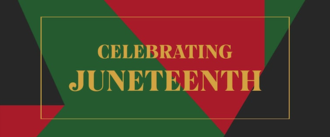
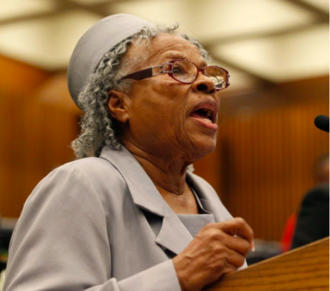






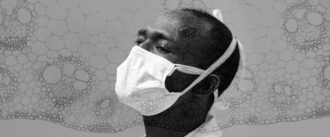
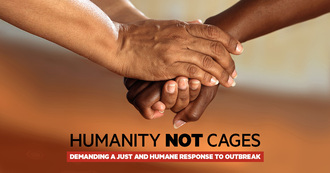
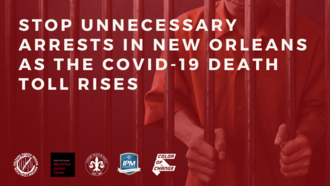.png)
